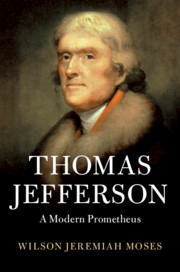Book contents
- Thomas Jefferson
- Cambridge Studies on the American South
- Frontispiece
- Thomas Jefferson
- Copyright page
- Dedication
- Contents
- Preface
- Acknowledgments
- Note on Methods and Bibliography
- 1 Introduction
- 2 Lincoln and Historiography
- 3 Let Our Workshops Remain at Monticello
- 4 Life, Liberty, Property, and Peace
- 5 What is Genius? “Openness, Brilliance, and Leadership”
- 6 A Renaissance Man in the Age of the Enlightenment
- 7 Baconism and Natural Science
- 8 Anthropology and Ethnic Cleansing: White “Rubbish,” Blacks, and Indians
- 9 Education, Religion, and Social Control
- 10 Women and the Count of Monticello
- 11 Debt, Deference, and Consumption
- 12 Defining the Presidency
- Index
10 - Women and the Count of Monticello
Published online by Cambridge University Press: 01 April 2019
- Thomas Jefferson
- Cambridge Studies on the American South
- Frontispiece
- Thomas Jefferson
- Copyright page
- Dedication
- Contents
- Preface
- Acknowledgments
- Note on Methods and Bibliography
- 1 Introduction
- 2 Lincoln and Historiography
- 3 Let Our Workshops Remain at Monticello
- 4 Life, Liberty, Property, and Peace
- 5 What is Genius? “Openness, Brilliance, and Leadership”
- 6 A Renaissance Man in the Age of the Enlightenment
- 7 Baconism and Natural Science
- 8 Anthropology and Ethnic Cleansing: White “Rubbish,” Blacks, and Indians
- 9 Education, Religion, and Social Control
- 10 Women and the Count of Monticello
- 11 Debt, Deference, and Consumption
- 12 Defining the Presidency
- Index
Summary
When Jefferson wrote in the Declaration of Independence that “All men are created equal,” it was no mere instance of synecdoche (or any literary device that uses one word to represent a greater whole). He did not intend to write, as one might write in the twenty-first century, “all men and women are created equal.” His reference to “all men” should not be shifted into the category of what used to be called “non-specific gender.” It was neither an innocent slip of the pen nor an accident of contemporary vernacular diction. He wrote “men” meaning “men,” without considering the word as an inclusive metaphor, and there was no tacit understanding that it encompassed women in the fullest cultural or political sense. Abigail Adams’ noteworthy “Remember the ladies” injunction did not affect the deliberations of the Continental Congress.
- Type
- Chapter
- Information
- Thomas JeffersonA Modern Prometheus, pp. 364 - 388Publisher: Cambridge University PressPrint publication year: 2019

